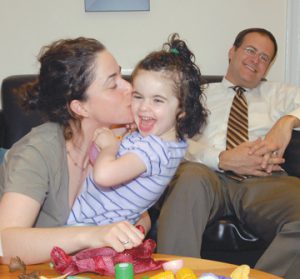
From birth it wasn’t easy for Lilah Petersiel.
She was born with only one kidney and when doctors took an ultrasound to see if the organ was functioning, they found something not quite right.
After a referral to the Hospital for Sick Children, it was soon learned that she had a severe childhood cancer known as neuroblastoma. Instead of a life filled with learning to walk, talk and smile, Lilah’s was taken up with doctor visits, surgery and aggressive chemotherapy.
For her parents Eric Petersiel and Tami Moscoe it was a Pandora’s box, and it took away their first experience of parenting.
“We just really didn’t understand what was happening,” says Petersiel. “We sort of sleepwalked our way through the first year of our daughter’s life.”
Neuroblastoma is a cancer that affects the nervous system, growing tumours at an alarming rate. If not discovered in the first 15 months of life, a child has only a 20 percent chance of survival.
For the eight-pound newborn, a tumour the size of a golf ball was found on her adrenal gland. The gland was removed, and doctors believed it would be the end of the cancer.
But it spread to the liver.
A portion of that organ was removed and four rounds of chemo ensued.
“There’s no way for us to know if something has come back again, and this is a horrible disease that unfortunately returns and has devastating results,” Petersiel says.
Seeing their child face their mortality right from the start is nightmare for any parent but there is help.
David Brownstone works as a clinical social worker in the pediatric brain tumour program at Sick Kids. His role is to help families adjust to being in a hospital environment.
“(Mortality) is an incredibly difficult, uncomfortable thing to face,” he says. “And sadly, one of the difficult pieces is that people are not here on their own choice. You’ve got to figure out some way to make it through.”
Compounding the problems faced by families is long-distance travel.
The Petersiel family was lucky to live in the Bathurst and St. Clair neighbourhood not far from the hospital.
However, Brownstone recalls watching a family for 12 weeks in the intensive care unit from Prince George, B.C., and another family who drove from Picton every day for their 12-year-old daughter who had leukemia.
“They were splitting up their family, driving in and leaving one person at the hospital with their daughter … they were there, off-and-on, for eight months,” Brownstone says.
That’s where Ronald McDonald House helps.
The charity provides a home for families that live over 70 kilometres away from Toronto.
Families can stay for as a little as two weeks or as a long as a year, depending on the child’s treatment, says Candice Gurwitz, the house’s family program and volunteer coordinator.
They don’t offer much in counselling, but they do provide a home for families, putting on fun events, having companies come in and cook meals, and even teaching curriculum to children missing school.
“(Parents) aren’t coming for medical treatment, or any type of treatment,” says Gurwitz. “They’re coming here because it’s home.”
That ease and homey feel is what parents and children need when dealing with emotional and financial burdens.
“It is entirely draining in every way,” Petersiel agrees. “It destroys (parents’) experience of life because they no longer can operate and deal with the everyday realities.
“It literally strains your entire being,” he adds. “Even if the threat passes, you’ve lost a portion of your life.”
Lilah’s parents took a proactive approach to dealing with her neuroblastoma. Petersiel says they channeled their “nervous energy” into a fundraiser called, ‘Sunday in the Park with Lilah.’
The event, in its fourth year, has raised over $300,000 for research into cures for childhood cancers, something not pursued enough, Petersiel says.
“There’s just no research because there are so few patients,” he says. “The only money is in the majority of cases, so prostrate and breast cancer have huge funds thrown at them because there are so many sufferers.”
Sunday in the Park with Lilah takes place June 22 at Fieldstone Day School, and the bubbly four-year-old girl, survivor of an enduring battle with cancer, will be there to meet all who attend.
